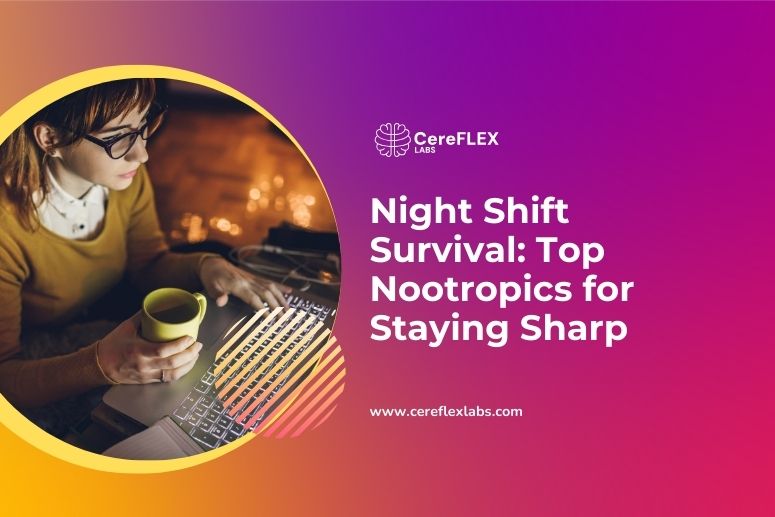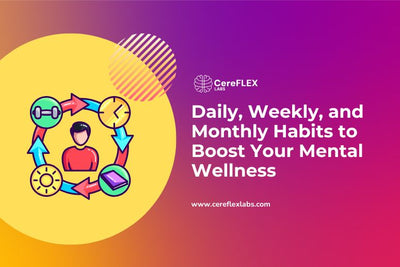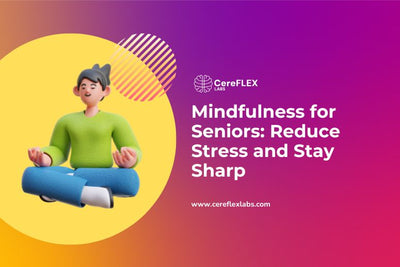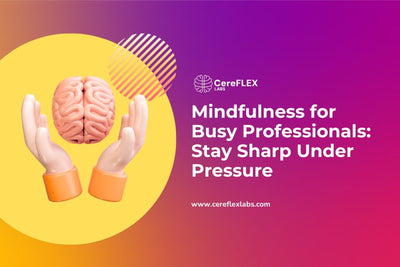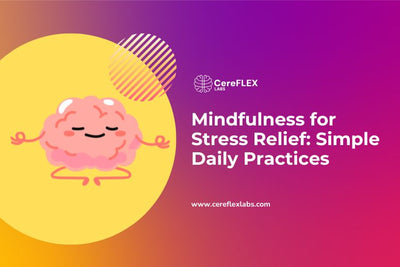Night shifts can be physically and mentally exhausting. Whether you work in healthcare, security, transportation, or industrial roles, staying alert during non-traditional hours can be challenging. Disruptions to your body's circadian rhythm often lead to fatigue, slower reactions, and cognitive decline, affecting both job performance and overall well-being.
So, how can you stay awake, focused, and energized when working against your body’s natural clock? While lifestyle adjustments play a crucial role, incorporating natural cognitive boosters for energy can provide an extra edge in sustaining focus and mental clarity during demanding night shifts.
Nootropics, also known as cognitive enhancers, can help optimize brain function, support wakefulness, and improve concentration—without the crashes and jittery effects of traditional stimulants. However, not all nootropics work the same way. To get the best results, it’s essential to combine them with healthy lifestyle habits for sustained cognitive performance.

How Night Shift Work Disrupts Circadian Rhythms and Sleep
Night shift work forces the body to operate against its natural circadian rhythm, the internal clock that regulates sleep and wakefulness based on light exposure. During the day, hormones like cortisol keep you alert, while at night, melatonin signals the body to sleep. Staying awake when the body expects rest disrupts this cycle, leading to fatigue, cognitive decline, and long-term health risks.
Disrupting circadian rhythms can cause:
- Reduced cognitive function, impairing memory, problem-solving, and reaction time.
- Energy crashes, making it harder to stay focused and motivated.
- Increased health risks, including higher chances of heart disease, obesity, and metabolic disorders.
A major challenge for night shift workers is Shift Work Sleep Disorder (SWSD), a condition marked by insomnia, excessive daytime sleepiness, and difficulty concentrating. Many workers with SWSD struggle to get restorative sleep, leading to chronic fatigue and decreased job performance.
Common Issues Night Shift Workers Face
Night shift workers operate against the body’s natural rhythm, leading to mental fatigue, slower reactions, metabolic imbalances, and mood disturbances. These challenges not only affect work performance but also impact long-term health and well-being.
Cognitive Fatigue & Slower Reaction Times
Constantly fighting against the sleep-wake cycle weakens decision-making skills, problem-solving abilities, and memory retention.
Slower reaction times pose significant risks, particularly in high-stakes jobs like healthcare, security, and transportation, where split-second decisions matter.
Over time, these effects lead to brain fog, making even simple tasks feel overwhelming.
Physical Exhaustion & Increased Health Risks
Night shift work raises the risk of heart disease, diabetes, and high blood pressure due to disrupted metabolic processes. Hormonal changes can lead to increased cravings for unhealthy foods and weight gain, while mood disturbances like anxiety, depression, and irritability make it difficult to stay motivated and focused.
Difficulty Sleeping After a Shift
Falling asleep post-shift can be a struggle. Exposure to sunlight suppresses melatonin, making it harder to relax, while daytime noise and personal responsibilities further disrupt rest. Irregular sleep patterns result in chronic fatigue, forcing many workers to rely on stimulants to stay awake during shifts.
Managing These Challenges: While night shift work presents unique difficulties, the right nootropics and lifestyle strategies can help sustain focus, energy, and cognitive function. In the next section, we’ll explore the best nootropics for night shift workers and how they can optimize alertness and performance.
What are the best nootropics for night shift workers?
Nootropics help enhance focus, mental clarity, and sustained energy, making them valuable tools for night shift workers who struggle with fatigue, brain fog, and disrupted sleep cycles. Some nootropics work by boosting neurotransmitter activity, while others reduce stress and regulate energy levels.
Here are the best nootropics for night shift workers to stay sharp, alert, and resilient during overnight shifts.

Caffeine + L-Theanine – Balanced Stimulation Without Jitters
Caffeine is a widely used stimulant that blocks adenosine, the neurotransmitter responsible for sleepiness. While effective, excessive caffeine can cause jitters, anxiety, and energy crashes.
Pairing it with L-Theanine, an amino acid found in tea, creates a smoother, more focused energy boost. Studies show that this combination enhances accuracy, reaction times, and alertness while reducing fatigue and headaches.1
Rhodiola Rosea – Fighting Fatigue & Improving Focus
Rhodiola Rosea is an adaptogenic herb known for reducing stress and mental fatigue. It increases motivation, improves concentration, and may enhance memory by supporting dopamine and serotonin balance.
A study on night-shift doctors found that those taking Rhodiola Rosea Extract (RRE) experienced significant improvements in memory, concentration, and cognitive speed compared to those on a placebo.2 These benefits were especially noticeable in the first two weeks of use, with no reported side effects.
Ashwagandha – Stress & Cortisol Regulation
Ashwagandha has been used for centuries in Ayurvedic medicine to help the body adapt to stress. It works by lowering cortisol levels, the hormone released during stress, which can improve mood, reduce anxiety, and promote relaxation.
In a study with 58 participants, those who took 250–600 mg of Ashwagandha extract for eight weeks had significantly lower stress levels and improved sleep quality.3 Another study showed it enhanced psychological well-being, memory, and focus.4
Best Timing for Shift Workers: Take Ashwagandha in the evening before starting your night shift rather than in the morning after work. This helps manage stress levels and adjust to irregular work hours.
Modafinil – Prescription Alertness Aid
Modafinil is a prescription stimulant used to treat Shift Work Sleep Disorder (SWSD) and narcolepsy. It enhances wakefulness and cognitive function without the jittery effects of caffeine.
Studies show that a 300 mg dose of Modafinil can help individuals stay alert for up to 12 hours in sleep-deprived conditions. Another study found that after 64 hours without sleep, Modafinil improved reaction time, logical reasoning, and short-term memory compared to a placebo.
Important Note: Modafinil is a controlled prescription medication, so it should only be used under medical supervision.
Best Practices for Using Nootropics Safely
While nootropics can enhance cognitive performance, they should complement—not replace—healthy habits like proper sleep, nutrition, and exercise.
✔ Start with small doses and assess how your body responds before increasing intake.
✔ Avoid dependency by cycling nootropics rather than taking them daily.
✔ Stack nootropics wisely, such as pairing caffeine with L-Theanine for better focus or combining adaptogens with B vitamins to manage stress.
✔ When considering managing circadian rhythm with nootropics , consult a healthcare professional for personalized guidance on safe and effective use.
Lifestyle Strategies to Stay Alert During Night Shifts
Nootropics can enhance cognitive function, but lifestyle habits play a crucial role in sustaining energy, focus, and overall well-being for night shift workers. Implementing key strategies can help combat fatigue and optimize performance during overnight hours.

Follow a Balanced Diet for Sustained Energy
Night shift work can disrupt metabolism, increasing the risk of weight gain and energy fluctuations. To stay alert, shift workers should eat in a way that supports steady blood sugar levels.
Sticking to regular meal patterns similar to a daytime routine can help regulate energy. Small, frequent meals prevent sluggishness, while whole grains, lean proteins, dairy, fruits, and vegetables offer steady fuel.
In contrast, fried, processed, or overly spicy foods can slow digestion and contribute to discomfort.
Sugary snacks provide a temporary energy boost but often lead to crashes later. Healthier alternatives, such as fruits and fiber-rich vegetables, supply essential vitamins while offering a natural energy lift.
Staying hydrated is also key, but drinking too many fluids before sleep should be avoided to prevent frequent wake-ups.
Exercise to Boost Energy and Focus
Engaging in moderate exercise before a shift can help workers feel more awake and improve circulation, making it easier to focus. A brisk walk, light cardio, or stretching signals the body to prepare for wakefulness.
Movement during shifts also plays an important role. Short walks or simple stretches during breaks prevent stiffness from prolonged sitting or standing and promote blood flow, which reduces tiredness and improves concentration.
Take Strategic Naps to Reduce Fatigue
A well-timed nap can make a significant difference in alertness during night shifts. A short nap of 20 to 45 minutes before starting work improves reaction time and reduces drowsiness.
Mid-shift naps, when possible, offer an additional alertness boost, but they should be kept under 45 minutes to avoid grogginess. Since sleep cycles last approximately 90 to 100 minutes, waking up mid-cycle can leave workers feeling sluggish, so tracking optimal nap durations is essential.
Manage Light Exposure to Stay Alert
Light exposure is a powerful tool in regulating the body's sleep-wake cycle. At the start of a shift, exposure to bright artificial light, such as a light therapy lamp, signals wakefulness to the brain.
Conversely, after a shift, limiting light exposure can help the body transition into sleep mode. Wearing blue-light blocking glasses and using blackout curtains can assist in maintaining a healthy sleep schedule despite working irregular hours.
Adjust Sleep Patterns for Better Recovery
Gradually shifting a sleep schedule can help workers adapt to night shifts more effectively. Staying awake as late as possible for a few nights before starting a night shift allows the body to adjust. Sleeping as long as possible during the day leading up to a shift can also ease the transition.
Over time, maintaining a consistent schedule, even on days off, helps stabilize the internal clock, reducing sleep disturbances and minimizing energy crashes.
By integrating these strategies with the right nootropics, night shift workers can enhance alertness and sustain cognitive performance throughout their shifts.

15 Sleep Hygiene Tips for Night Shift Workers
Maintaining good sleep habits is essential for night shift workers to ensure quality rest, recovery, and overall health. By following these strategies, shift workers can improve sleep efficiency despite irregular schedules.
1. Stick to a Consistent Sleep Schedule – Go to bed and wake up at the same time every day, even on days off, to help regulate your circadian rhythm.
2. Prioritize At Least Seven Hours of Sleep – Aim for sufficient rest to allow your body to fully recover.
3. Use Calming Music to Wind Down – Soft instrumental music or white noise can signal the body that it’s time to relax.
4. Read a Book Before Bed – Reading slows the mind and helps transition into sleep, but avoid screens and backlit devices that emit blue light.
5. Take a Warm Bath Before Sleeping – A warm bath relaxes muscles and lowers body temperature, making it easier to fall asleep.
6. Practice Meditation or Mindfulness – Engaging in deep breathing exercises or meditation helps reduce stress and prepare for rest.
7. Keep the Room Cool – Maintain an ideal sleeping temperature of 65–68°F (18–20°C) to promote deep sleep.
8. Minimize Noise Disturbances – Use earplugs, white noise machines, or soundproofing techniques to create a quieter sleep environment.
9. Block Out Light for Better Rest – Use blackout curtains and eye masks to prevent exposure to daylight, which can disrupt melatonin production.
10. Limit Screen Time Before Bed – Reduce blue light exposure at least one hour before sleep to avoid melatonin suppression.
11. Avoid Stimulating Activities – Stay away from intense TV shows, social media scrolling, or mentally engaging activities before bedtime.
12. Train Your Brain to Associate the Bed With Sleep – Reserve your bed for sleep only, avoiding activities like work or phone use.
13. If You Can’t Sleep, Get Up – Instead of lying awake, do a calming activity like stretching or reading for a few minutes.
14. Avoid Staying in Bed Awake for Too Long – Lying awake for extended periods creates stress and makes it harder to fall asleep.
15. Stop Caffeine Intake Well Before Bed – Avoid caffeine at least 10 hours before sleeping to prevent it from interfering with sleep quality.
By implementing these habits, night shift workers can improve their sleep cycles, boost daytime recovery, and feel more refreshed for their next shift.
CereFlex Labs Science-Backed Cognitive Support
CereFlex Labs’ AM/PM Protocol is designed to enhance mental clarity, memory, and overall brain health with a targeted, science-based approach. This dual-formula system ensures all-day cognitive support, helping night shift workers stay sharp and focused.
AM Brain Morning Formula: This formula supports memory, concentration, and cognitive processing while improving blood circulation to the brain. Packed with antioxidants, vitamins, and essential minerals, it helps protect brain cells from oxidative stress, ensuring sustained mental performance throughout the day.
PM Cognitive Support Evening Formula: Working in tandem with the morning formula, the PM blend promotes nighttime cognitive recovery. This multi-vitamin and multi-mineral supplement helps maintain cognitive resilience, neurological function, and mental clarity, supporting brain health even while you rest.
By combining these science-backed formulations, the CereFlex Labs AM/PM Protocol offers a comprehensive and easy-to-follow brain support system for those managing demanding work schedules, including night shift professionals.
Conclusion: Optimize Your Night Shift Performance
Battling fatigue after night shifts requires a comprehensive approach, combining nootropics, lifestyle adjustments, and strong sleep hygiene. By integrating these strategies, night shift workers can maintain sharp focus, steady energy, and overall well-being despite demanding schedules.
Since individual responses to nootropics and lifestyle changes vary, it’s essential to experiment and find the right combination that works best for you. Nootropics should be used as a supportive tool—not a crutch—to promote long-term mental resilience and physical endurance.
For those seeking a science-backed cognitive solution, CereFlex Labs’ AM/PM Protocol offer a targeted way to combat fatigue, enhance concentration, and support healthy sleep cycles. Explore our formulas today and take control of your cognitive health.
